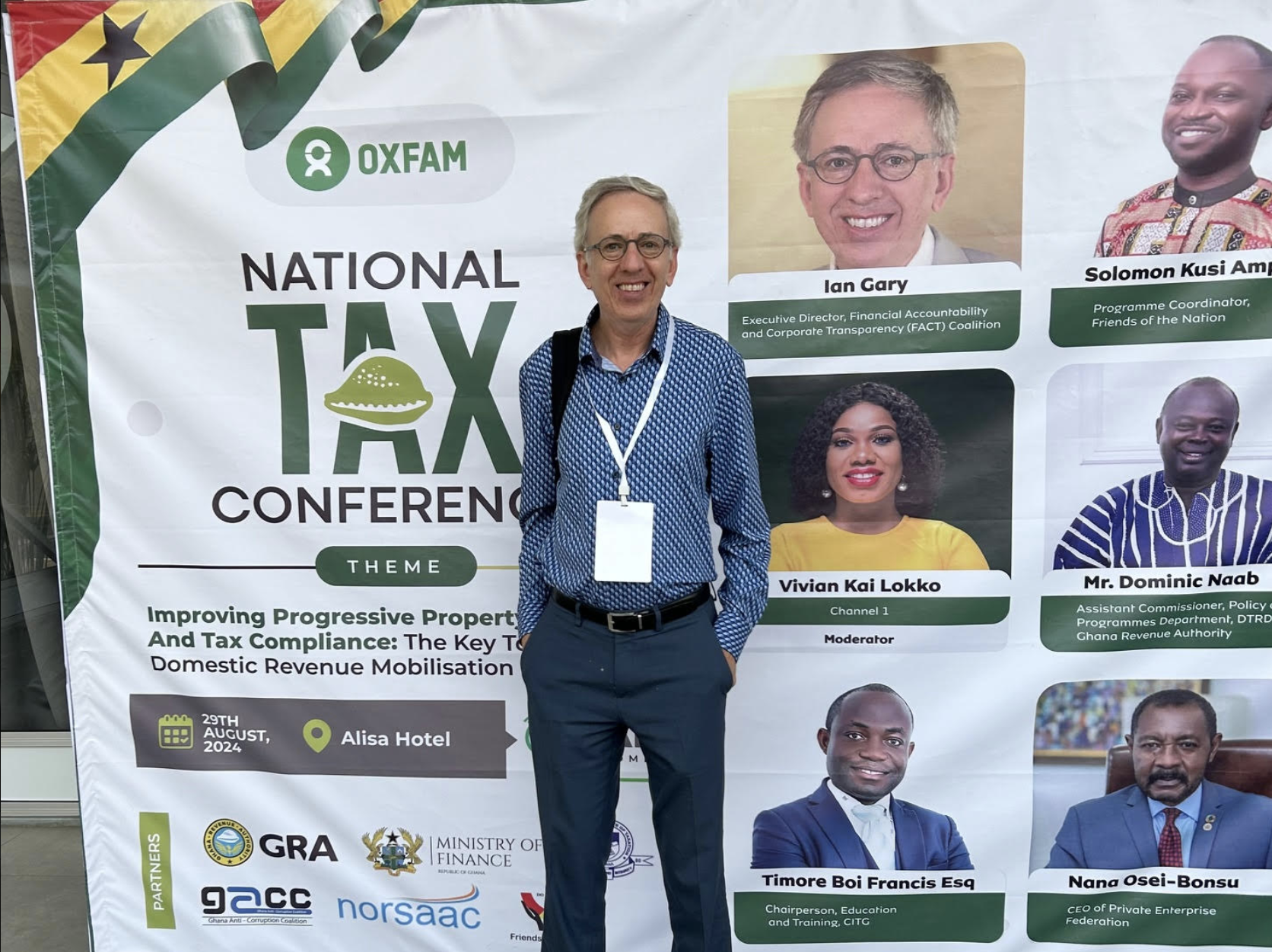World leaders are gathering this week for the U.N. General Assembly and wherever powerful leaders gather, money is on the agenda. Those gathered for the parallel “Climate Week” in New York are discussing where to find the money to deal with the climate crisis. Beyond climate change, world leaders, especially in the Global South, are struggling with multiple crises, including crushing debt burdens and growing economic inequality. There is also the yawning gap between the aspirations of the U.N. Sustainable Development Goals and the ability to finance them. Addressing all of these issues will take trillions of dollars. A new FACT Coalition policy brief published this week explains why increased tax transparency should be a part of the financing solution for Global South countries.
I’ve recently returned from Ghana, where I spoke at a national tax conference organized by the Ministry of Finance and Oxfam in Ghana. Ghana is a country grappling with a debt crisis, a “cost of living crisis”, and the urgent need to find additional revenue. Like many Global South countries, Ghana is advocating for a fairer global tax system and frantically looking for ways to increase, in development jargon, “domestic revenue mobilization”.
For too long, the global tax system has facilitated rampant tax avoidance, with the OECD estimating that global tax losses from profit shifting ranging from $100 billion to $240 billion every year. According to the E.U. Tax Observatory, these losses are hitting lower-income and lower-middle-income countries (such as Ghana) particularly hard. Meanwhile, The U.N. estimates the total cost to achieve the Sustainable Development Goals (SDGs) by 2030 in Africa at $1.3 trillion annually.
The current multinational corporate tax system has been a target for reform, with the OECD’s two-pillar solution being implemented by a range of countries and movement at the U.N. to advance a “tax convention”.
Information is power, and some of the reform efforts advanced by the OECD, including a system of sharing “country-by-country reports” detailing multinational tax and financial information, have left many Global South countries in the dark. As our new brief notes, these country-by-country reports – detailing a multinational corporation’s revenue, taxes paid, number of employees, and other data – can provide tax authorities with valuable information to “assess transfer pricing risks, determine where audit resources are best deployed… and highlight entities with the highest likelihood of profit-shifting activities.”
Unfortunately, no least-developed countries and few middle-income countries have access to these reports. Only five African countries are receiving any country-by-country reports, and barriers to access and use of these reports are a significant obstacle for African tax authorities. Public country-by-country reports would overcome these obstacles, and tax officials I spoke to in Ghana confirmed that having access to this information would be a game changer.
The FACT Coalition policy brief, written by our former policy fellow, Gabriel Aliu, a U.S. and Nigeria-trained tax lawyer, is full of testimony from experts and African tax authorities on the value of this information. Darlington Talery, Commissioner of Domestic Taxes for the Liberian Internal Revenue, told FACT that “Public country-by-country reporting is a very good idea… With more information, it will aid our audit work and our compliance work.” Nigeria’s Coordinating Director for the Federal Inland Revenue Service, Matthew Gbonjugbola, described the difficulty in getting information on multinational corporations: “I have been a tax officer for almost three decades and I know the struggle we go through to get multinationals to provide basic data.”
While comprehensive global multinational corporate tax reforms continue to advance, increasing access to public country-by-country reports is a near-term policy solution to advance tax justice and increase revenues in Global South countries. As FACT Coalition ally Chenai Mukumba, executive director of the Tax Justice Network-Africa, says in the policy brief, “Public country-by-country reports can play a critical role in addressing illicit financial flows. It places the compliance burden on multinational enterprises rather than tax administrators who, within the African context, have limited capacity.”
Luckily, global momentum is growing to require public country-by-country reports. The EU’s limited form of reporting will begin producing public reports in the coming years, and Australia is expected to pass public country-by-country reporting legislation soon. In the U.S., investors worth $2.3 trillion in assets under management have called on the U.S. Securities and Exchange Commission to mandate these disclosures by publicly-traded multinationals.
Last week, The Economist magazine said that developing countries have experienced a “brutal decade” and that “aid is not coming to the rescue”. To turn this situation around, tax reform must be at the center of the “financing for development” agenda. Tax transparency has a key role to play to help Global South countries generate revenues to respond to the climate crisis and meet their urgent self-determined development needs.

